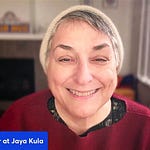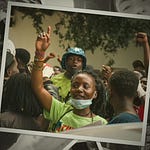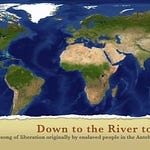Gestation
Shortly after October 7th, I had the good fortune of beginning to learn about and learn from a number of both younger and more established Palestinian poets.
Some of the poets have put out calls for people to record themselves reading poems. I finally got around to it, and also added in a couple of Palestinian poets who I don’t know personally, but who have made a deep impression on my heart.
Poets
Fady Joudah is a widely-published, award-winning Palestinian-American poet and physician. His parents came to the U.S. as refugees. The poem I read is from his extraordinary book [...]: Poems.
Taqwa Al-wawi is a young poet and Gazan writer documenting the genocide. She was an English literature student at the Islamic University of Gaza until it was destroyed by Israel on October 10, 2023. The poem I read is titled: “Three Days of Isolation.”
You can read Taqwa’s writings here.
Hend Jouda is an award-winning Gazan poet, songwriter, and short story writer who is gaining in recognition internationally. She has published four collections of poetry: Someone Always Leaves (2013), No Sugar in the City (2017), and A Finger That Managed to Survive (2024), and Gaza: Ô Ma Joie (2025 French).
You can read some of her more recent poems here.
Samih al-Qasim (1939-2014) was a Palestinian poet and journalist with Israeli citizenship. He refused to join the Israeli military and was jailed and lived under house arrest several times for his advocacy for a Palestinian state.
The poem I read, “Enemy of the Sun,” was first published in 1970, and it has only gained layers of meaning over time.
“Enemy of the Sun” inspired early activists in the U.S. Black Power movement—a movement that shaped my thinking and feelings as a child. It still serves as a bridge between Black liberation movements in the U.S. and the Palestinian liberation movement.
The reference to a triumphant return by sailboat at the end of the poem seems to create another bridge to the brave activists of the Madleen.
Finally, the sun in my spiritual tradition is the most essential symbol of wisdom. Those who commit genocide eclipse that wisdom, but in the end, wisdom is always victorious.
with infinite love,
Shambhavi
P.S. I apologize in advance for any errors in my pronunciation of Arabic names.
Not quite ready to fire up a paid subscription, but want to show your appreciation?
Please join Shambhavi and the Jaya Kula community for satsang & kirtan every Sunday at 3:00pm Pacific. Come in person to 1215 SE 8th Ave, Portland, OR, or join Jaya Kula’s newsletter to get the Zoom link for satsang. You can also listen to my podcast—Satsang with Shambhavi—wherever podcasts are found.










